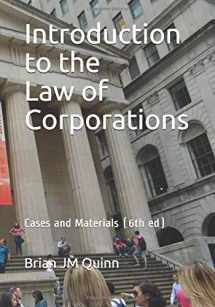
Introduction to the Law of Corporations: Cases and Materials (6th ed) (Law School OER)
Book details
Summary
Description
This open-source casebook is the sixth edition of a casebook using the H2O/OpenCasebook platform of Harvard's Berkman Center. This casebook is intended to be used as the main casebook for an introductory course on the law of corporations. Because is subject to a Creative Commons license and can be printed via Amazon KDP, it is available to students at a very modest cost. Alternatively, students can read and access the cases and materials online via the H2O platform at opencasebook.org at no cost. This casebook and the H2O/OpenCasebook platform are part of an effort by educators to make high quality course materials and casebooks available to students at reasonable prices. Although this course is called an Introduction to the Law of Corporations, it is better understood as a more general business organizations course. The materials in this casebook cover Delaware corporate code exclusively. However, your learning during this semester long course will not be limited to the corporate law. We will start the class with an online course covering the basic concepts of Agency. Agency is the single most important building block required to understand the corporate law. Agency is also an essential building block to understand the laws governing other forms of business organization. During the course of this semester, you will be introduced to other forms of business organization, including Partnership, Limited Liability Companies, Nonprofit Corporations, and Public Benefit Corporations. Most of your introduction to these other forms will come through a series of online courses covering the basic concepts and rules for each of the forms. You should plan to complete all of these courses, including the accompanying quizzes in Canvas, by the dates set forth in the syllabus. As you are working on the online courses, in class we will focus on the corporate form, the Delaware corporate code, and the Delaware common law of corporations. Because the corporate law is so much more extensive than the laws of other business forms, like for example the law governing LLCs, courts often lean heavily on the corporate law and apply it by analogy to other forms when they are in search of persuasive authority. By becoming expert in the corporate law, you will find it easy to translate that knowledge and apply it other business organizations. Much of the work of the corporate lawyer starts with the code. As such, we will start with an in depth examination of the corporate code. Although we could study the Model Code or the Massachusetts code, for most corporate lawyers, the Delaware corporate law will be central to their practice. Sixty percent of all publicly traded corporations are Delaware corporations. With respect to private corporations, they are typically incorporated in the state in which they are physically located, or they are incorporated in Delaware. Beyond the code, Delaware has a very deep corporate common law. It is in the corporate common law that the courts have developed the law of corporate fiduciary duties. It is through fiduciary duties that the corporate law attempts to regulate the relationship between stockholders and the corporation, between managers and the corporation, as well as the relationships of controlling stockholders and minority stockholders. Delaware's treatment of the corporate common law is so extensive that it is not at all uncommon at all for the courts of other states to refer to, or cite Delaware corporate law cases, when deciding questions involving their own corporate law. The Delaware corporate law is the closest we have to a lingua franca in the US for corporate law. The fiduciary duties of corporate directors are tested most often in the context of corporate takeovers. The corporate takeover materials in this casebook attempt to highlight the most important issues in takeover situations as well as the court's doctrinal efforts to mitigate the transaction costs that arise in these situations.


We would LOVE it if you could help us and other readers by reviewing the book
Book review



